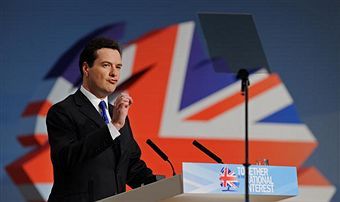 George Osborne delivered everything we expected, and then some. This was a confident and
wide-ranging speech from a Chancellor who has suddenly discovered a central message: what’s right about burning £120 million of taxpayers’ cash in debt interest payments every day? Wouldn’t
it be better to get to grips with that waste as soon as possible? And that message percolated down through everything from his attack on Ed Miliband to his case for reforming our public services.
“It’s like a credit card,” Osborne growled, “the longer you leave it, the worse it gets.”
George Osborne delivered everything we expected, and then some. This was a confident and
wide-ranging speech from a Chancellor who has suddenly discovered a central message: what’s right about burning £120 million of taxpayers’ cash in debt interest payments every day? Wouldn’t
it be better to get to grips with that waste as soon as possible? And that message percolated down through everything from his attack on Ed Miliband to his case for reforming our public services.
“It’s like a credit card,” Osborne growled, “the longer you leave it, the worse it gets.”
But if that was the theme of Osborne’s symphony, then the motif was certainly welfare. Huge chunks of this speech could have been delivered by Iain Duncan Smith, and probably will be when he addresses conference tomorrow. There was an emphasis on “making work pay,” and on the “biggest reform of the welfare system since William Beveridge.” But there were also some specifics: the child benefit cut, of course, and also the announcement of a new benefits cap. According to Osborne, that cap will mean that no family will earn more on benefits than the average family would by working.
Like Osborne’s inheritance tax cut, this benefit cap is probably more about politics than public finances. It will be set around £500 a week and, according to the numbers being put around by his team, will affect only 50,000 families, if not fewer. For some, apparently, that could mean losses of £300 a week – but I imagine the majority of savings will be far more modest than that. Yet the political statement is huge. This measure says, far more clearly than any discussion of marginal tax rates ever could, that the benefits trap is being sprung. And I imagine it will go down well with any taxpayers who feel that the current set-up is unfair on their wallets.
Questions on detail aside, I’d say that this was mission accomplished for Osborne. A pre-Spending Review speech was never going to be a thing of beauty and light. But this was strong enough, resonant enough, to keep the public on board for now.






Comments